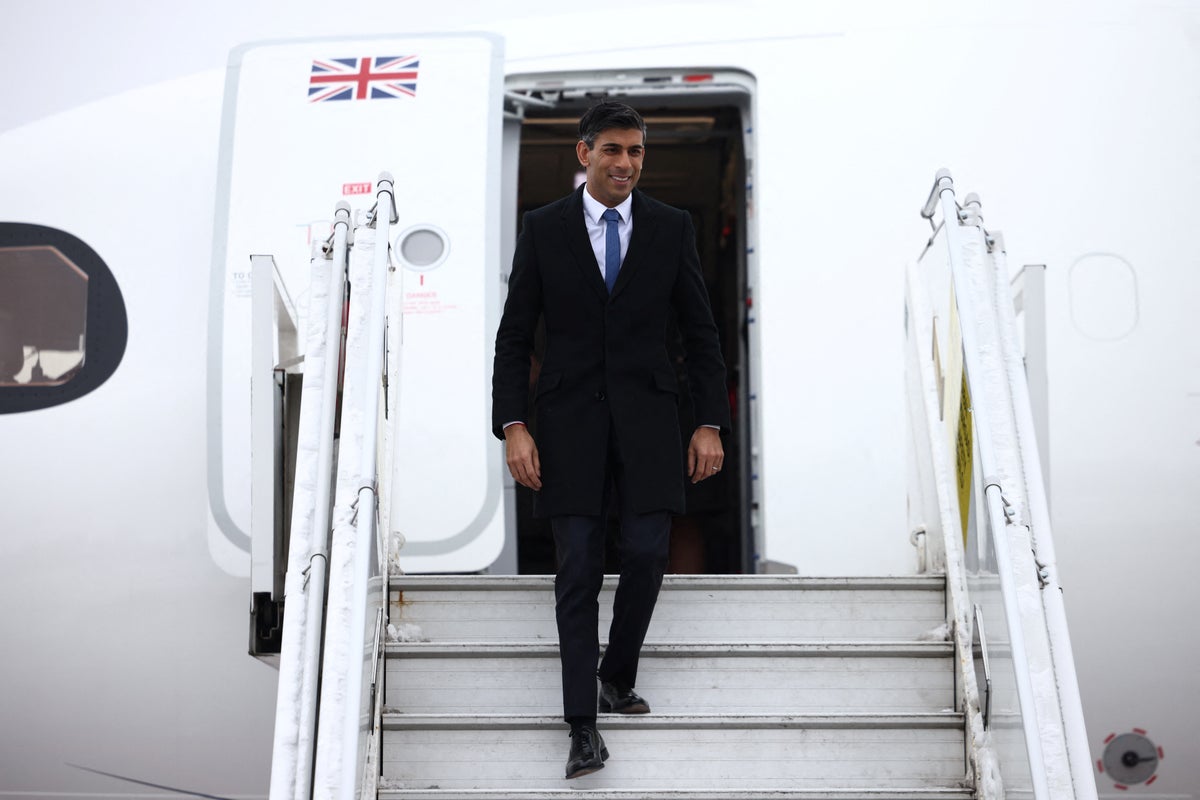
Rishi Sunak’s government has blocked the release of information detailing the prime minister’s taxpayer-funded private jet trips around the UK.
Labour accused Mr Sunak of presiding over a “culture of concealment” after Downing Street refused a request by The Independent to detail how many flights were taken, how much they cost or how much CO2 they admitted into the atmosphere.
Mr Sunak has used an RAF plane for domestic visits on at least three occasions since entering office in September last year for journeys that would have taken hours by train.
“Rishi Sunak’s culture of concealment is reaching ridiculous levels,” Emily Thornberry, Labour’s shadow attorney general, told The Independent.
“The Cabinet Office has an explicit target to reduce its number of domestic flights, so how on earth can it be unreasonable to ask the prime minister what contribution he is making towards that goal?”
She added: “If he truly believes the only way he can travel around Britain is by helicopter and private jet, he should just be honest and open about that instead of trying to hide behind this pathetic silence.”
The Cabinet Office previously said it has been the practice of successive governments not to publish “granular” information about the flight details of protected individuals, suggesting that its decision not to release the information was based on security concerns.
Boris Johnson, who often trumpeted his climate credentials, was also criticised for using private taxpayer-funded planes for domestic travel after taking a flight from a family holiday in Cornwall to London.
No 10 declined to say whether the refusal to disclose domestic flight information was based on ministerial discretion or advice from another authority, such as the security services.
Information about ministers’ overseas flight travel – including how much it cost to charter the aircraft used - is, however, regularly made public.
One of the most recent entries published in the ministers’ transparency log shows that Mr Sunak took a private jet to the Cop27 climate summit in Egypt in November last year, costing the taxpayer £107,966.
No 10 also published a photo of Mr Sunak boarding a private jet to Leeds earlier this year.
PM boards an RAF jet for a trip to Leeds in January— (No 10/Flickr)
Mr Sunak flew to Blackpool, Leeds and Inverness in the space of just a few days in January with the outbound flights from near London taking 41 minutes, 36 minutes and 90 minutes respectively.
They would have produced more than 11 tons of harmful CO2 emissions, according to an estimate by the environmental charity Greenpeace.
The equivalent one-way journeys by train would take around 2 hours 53 minutes, 2 hours 27 minutes and 8 hours 21 minutes and would produce a total of 59kg of CO2.
The cheapest one-way tickets to Blackpool, Leeds and Inverness available on the morning of 7 July were for a combined cost of £234.20
“Sunak’s hugely destructive private jet habit has resulted in well over 150 times more carbon emissions than if he’d taken the train for these short jaunts,” Paul Morozzo, a senior campaigner at Greenpeace, said.
“The optics are terrible. But as the prime minister’s apathy towards tackling the climate crisis becomes ever more apparent, maybe the truth is he simply doesn’t care. Why else would he use such an environmentally damaging mode of transport that saves a negligible amount of time?”
He added: “If the UK is to retain its imperilled ‘climate leader’ status, Sunak must stop shunning public transport and set an example for us all to follow by banning the use of private jets, while investing heavily to improve rail and bus services making them better, more accessible and cheaper to use.”
Mr Sunak previously defended his use of the jets, saying that they enabled him to make the best use of his time. More recently the PM has used helicopters for domestic travel, although he has paid for these himself or through cash from donors.
Speaking at the Cop27 climate summit last year, Mr Sunak said it was “morally right to honour” the UK’s promises on reducing carbon emissions. The government insisted that emissions from flights taken by the PM were offset.
Last month parliament’s climate change committee said the UK was no longer a global leader in the fight to reduce emissions.
A government spokesperson said: “Domestic flights within the United Kingdom allow ministers to visit more parts of the United Kingdom in the time available, particularly areas further away from London, and reduce the need for overnight accommodation for ministers and accompanying staff.
“As always, travel plans will vary and are always decided with consideration to the best use of his time, security, and the interests of the taxpayer.”






